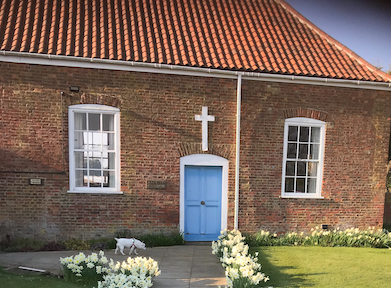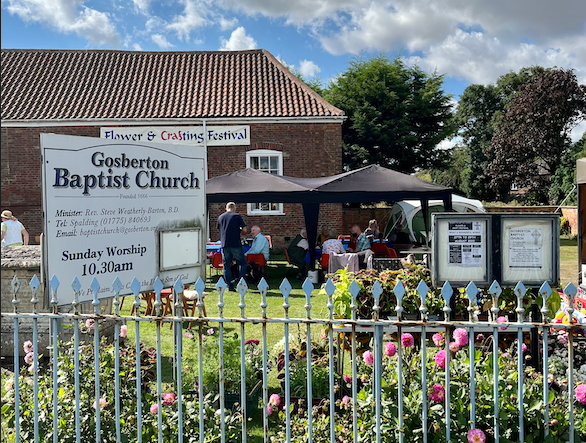 Gosberton Baptist Church was founded in 1666, a year better known for the discovery by Isaac Newton that a prism could split light into its constituent colours; the death of Dutch painter Frans Hals; and the devastating Great Fire of London. It was also the year when John Bunyan, best known for writing The Pilgrim's Progress, and himself a Baptist, was briefly released from Bedford Gaol before being re-arrested and serving a further six years imprisonment for "pertinaciously abstaining" from attending mandatory Anglican church services and preaching at "unlawful meetings".
Gosberton Baptist Church was founded in 1666, a year better known for the discovery by Isaac Newton that a prism could split light into its constituent colours; the death of Dutch painter Frans Hals; and the devastating Great Fire of London. It was also the year when John Bunyan, best known for writing The Pilgrim's Progress, and himself a Baptist, was briefly released from Bedford Gaol before being re-arrested and serving a further six years imprisonment for "pertinaciously abstaining" from attending mandatory Anglican church services and preaching at "unlawful meetings".
The restoration of the monarchy had led to an official crackdown by Charles the Second on the 'non-conformist' or 'separatist' churches which had been developing throughout the seventeenth century. Thomas Grantham, a Lincolnshire farmer and tailor, played a big part in encouraging Baptists in this area, and he or one of his friends almost certainly launched the church in Gosberton. Those early Baptists were neither protected by the law nor welcomed in society. Described at the time as "knavish, juggling, impudent and fanatic fellows", they complained in a petition to the king that:
'We have been much abused as we passed the streets and as we sat in our houses; being threatened to be hanged, if only heard praying in our families. We have been stoned when going to our meetings; the windows have been broken down; we have been taken as evil-doers, and imprisoned.'
In 1714 Parliament passed the 'Schism Act', which would have enforced discrimination against Baptists (as well as other Free Churches, and the Roman Catholic Church). On the day she was due to sign it, Queen Anne died of an apoplectic seizure. The Act never became law, and under George I Britain became an increasingly tolerant nation.
-----------------
The present building was used for 200 years, until in 1866 a new chapel was built to celebrate the church's bicentenary. The original meeting house was then used as a hall for the Sunday School, but by the beginning of the 1980s it was disused, unsafe, and likely to be demolished. Rev.Tom Gillies, the new minister, generated enthusiasm for raising funds to restore this piece of Lincolnshire history. Restoration work took place in 1984-85, with the porch extension finally completed in 1989. In due course it was the Victorian chapel that had to be demolished, having suffered from dry rot and storm damage, and the original 'meeting house' became once more the home of Gosberton Baptist Church.
Our present minister, Steve Weatherly-Barton, has been at various times a security guard, a Civil Servant, a taxi driver, a support worker with disabled students, and even an administrator for a Church of England vicar. He is more than ably supported by his wife Annie, who has worked as a graphic designer, served as a Parish Clerk, but whose first priority for many years has been caring for people who need love and encouragement.
Gosberton Baptists today enjoy a warm relationship with the other local churches. Like our predecessors in 1666 (and fellow Baptists around the world) we like to stress the need for personal faith in Christ, a faith which is normally confirmed and declared in baptism by immersion; our worship seeks to be flexible and informal; we value the regular reading and teaching of the Bible; and responsibility for the governing of the church lies with the local members rather than central authorities. But above all we cherish being part of God's family, along with all our fellow Christians in and around Gosberton. Together we seek to share the wonderful relevance of the good news of Jesus Christ to our neighbours in and around Gosberton.
-----------------
A photo from a recent Flower Festival:

Contact: Reverend Steve Weatherly-Barton on
01775 840693
or
email: baptistchurch (the usual at symbol) gosberton.org
or see our Facebook page by clicking below:
https://en-gb.facebook.com/pages/category/Community/Gosberton-Baptist-Church-100840343353393/